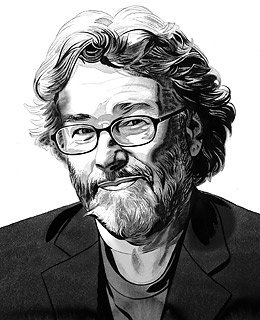
Iain M. Banks
One of the best novels written about Sept. 11, 2001, was published in August 2000. Look to Windward, by Scottish science-fiction writer Iain M. Banks, is set in a galaxy-wide civilization called the Culture that's so ridiculously technologically advanced that people have become functionally immortal godlings. They can do anything they want; therefore everything is a game and nothing matters. When they interfere in the affairs of a less advanced species called the Chelgrians, the Chelgrians retaliate with a grotesque act of terrorism.
The Culture novels (there are eight of them) are about the challenges of a world in which thinking beings must deal with one another across vertiginous gulfs of cultural and technological difference — a world, in other words, both completely different from and identical to our own. In Matter (Orbit; 593 pages), Banks' first Culture novel since Look to Windward, one of those technological gulfs opens up within a family: Djan Seriy is born into a royal clan on a backwater planet, but she is recruited into the Culture. Her brother Ferbin remains behind on their primitive home world. (Which is, incidentally, not a regular planet but a Shellworld, a synthetic planet constructed as a set of concentric spheres. At its center dwells a massive, near omnipotent alien deity. No one knows why; it just moved in one day.) When their father is murdered, the siblings must bring about justice and also come to terms with what Djan Seriy has become.
Banks writes space opera on the grand scale: he measures time in eons, space in light-years, tragedies in gigadeaths. His human players strut and fret on that vast stage, struggling to retain a sense of purpose. "Welcome to the future," thinks Djan Seriy bitterly. "All our tragedies and triumphs, our lives and deaths, our shames and joys are just stuffing for your emptiness." She could just as well have said, "Welcome to the present."